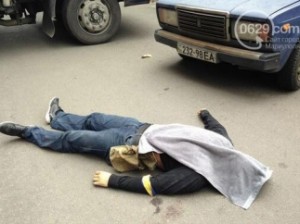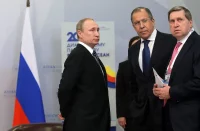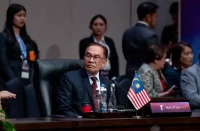Ukraine and Syria are both going to the polls in less than two weeks, but the election that is legitimate (Syria) is painted as a fraud by the West, and the actual fraudulent election (Ukraine) is promoted as legitimate. Comparing both of these cases back-to-back most strongly illustrates the hypocrisy behind the West’s position. By keeping in mind that it is the West that supports the Ukrainian junta and Russia and China (the leaders of ‘the Rest’) that support the legitimate Syrian government, the dichotomy over democratic practice becomes more acute, and not surprisingly, this illustrates the growing moral and normative authority that the Rest has over the West.
There are three main categorical comparisons, and the juxtaposition of the Ukrainian and Syrian scenarios will demonstrate the lack of democracy in the former and the vibrance of it in the latter.
The Population:

In Ukraine, there are hardly any rallies in support of the occupying junta, and in the ones that do occur, there is violence and the fostering of extreme and exclusive nationalism. It is more common to see concentrated public opposition to the “authorities”, not support, especially in the eastern part of the country. In Syria, the situation is reversed. There are countless peaceful pro-government rallies all throughout the country and abroad, and people even gather to support the army’s anti-terrorist successes. In Ukraine, the politicians have realized that their “anti-terrorist” operation is a disaster. Sensing the tidal wave of populism surging against them, the Rada recently voted to immediately halt the military suppression in the east. Whether or not the junta listens to its stooges is another story…
The situation with the extremists wreaking havoc in each country is also different. The Ukrainian militants are native Ukrainians influenced by Neo-Nazi ideologies, but in Syria, they’re largely Islamic fundamentalists from abroad. There are about 8,000 foreign fighters in Syria, a ten-time increase from last year, hailing from nearly 80 different countries. Quite clearly, the extremism in Ukraine is homegrown, while in Syria it is exported from abroad.
The Electoral Process
This section can be subdivided into three parts:
Structure:
The Ukrainian “elections” are an attempt to legitimize the coup’s militant takeover de-jure, but in Syria, they are to show the people’s opposition to a coup attempt. As such, the US has had a guiding influence over the junta’s activities, but in Syria, it has no such influence over the government or presidential candidates. This gives each voting exercise a completely different structure and helps explain the US’ discrepancies in labelling one legitimate and the other not. The Ukrainian one is to solidify servitude to the outside-supported elite, while the Syrian one is to safeguard the country’s successful resistance to such chains of despondence.

Choices:
The people of Ukraine don’t really have a choice in the upcoming elections – it’s basically one oligarch versus another. Petro Poroshenko, one of the most prominent oligarchs in the country, is the current front-runner, with disgraced politician and former Western darling Yulia Tymoshenko, also a ruthless oligarch, trailing far behind. Mikhail Dobkin, representing the Party of Regions, isn’t involved in corruption and scandal like the other two candidates, but it is impossible for him to win under the current circumstances. Besides, the Communist Party is boycotting the vote and will not recognize its results, and Oleg Tsarev, an anti-junta candidate from the east, has withdrawn his candidacy. Political intimidation of voters and candidates has also been prevalent in Ukraine since the coup.
In Syria, however, none of the presidential candidates are oligarchs or Western agents of influence. All of the candidates are safe and none of them have been attacked by vicious antagonistic mobs, unlike Tsarev.It is important to note that there are no extremists running for president in Syria, as the Syrian government is adamant about stomping such vile influences out of society. This is in stark contrast to Ukraine, where Dmitro Yarosh, the extremist leader of Pravy Sektor, is running for president. Russia has placed a warrant for his arrest with Interpol, accusing him of inciting extremism and having fought with international terrorist gangs in Chechnya in the past. The fact that such an individual can aspire to become president in Ukraine (no matter how distant his chances of success), and the West’s support of such a “democracy”, speaks volumes about what “democracy” currently means to them.
Practice:
In practice, the vote in Ukraine is null and void before it has even begun. This is because Lugansk and Donetsk, collectively representing nearly 6 million people and having just voted for their self-determination, will be boycotting it. Incidentally, the West still seems to think that 6 million people boycotting the ballot (and more Ukrainians outside of those two regions may likely boycott as well) doesn’t affect the legitimacy of the results. On the other hand, in Syria, citizens are so enthusiastic to vote, that even those currently outside of the country are clamoring to participate. For all of its democratic rhetoric, some Western countries are suppressing these voters’ aspirations. The Syrian Foreign Ministry accuses France and Germany in particular of not allowing Syrians there to vote in the upcoming elections. This adds credence to the earlier claim that the West is against elections that it cannot influence and control.
The Political Context:

The political context is drastically different in each election theater. In Ukraine, unresolved atrocity investigations over the Maidan sniper attacks, the Odessa burnings, and the Mariupol massacre completely discredit the ruling regime. In Syria, the former atrocity accusations have been resolved and the government absolved of any complicity. The chemical weapons attack and the Houla Massacre were revealed to be false flag attacks by the extremists, not the authorities. Even the US gave up its misinformation campaign after their proxies were implicated as the true culprits.
Ukraine right now is not territorially unified, as the southeastern areas of Lugansk and Donetsk had recently voted for their self-determination and are boycotting the vote. The ruling figures in Kiev refuse to acknowledge their choice, yet they want to impose the election results on these individuals anyway. This is all done with the support of the US government. Syria, on the other hand, does not have any territorial unification issues. Territorial integrity is important because it allows elections to have legitimacy over the entire country and represent everyone in it. Syria has this, Ukraine does not.
Concluding Thoughts:
Both countries provide case studies of Western-sponsored regime change attempts, with Ukraine as the success and Syria as the failure. Syria’s identity as a resistance state has been reinforced by the Western- and Gulf-led militant mayhem within the country, but it was able to successfully fend off the fiends through its strong identity as the only consistently resistant state in the region. Ukraine, on the flip side, did not establish any such solid unifying identity since its independence (Syria’s was accelerated as a result of its wars with Israel), and this has led to the downfall of the state and its (permanent?) internal division. Syria provides a strong example of why resistance is not futile and how a strong understanding of purpose can hold a society together amidst outside centripetal attempts to tear it apart.
With all of this in mind, the elections most importantly signify the Rest’s moral and normative authority over the West. By supporting the Ukrainian junta’s electoral stunt and rejecting true democracy in Syria, the West has decimated its own democratic rhetoric. It will recognize the results of the Ukrainian “election” but not that of Syria’s proper one, and the Rest, led by Russia and China, will rightfully spearhead the diplomatic support of Syria’s while rejecting Ukraine’s. This coordination of Russo-Sino policy, in line with what was recently agreed upon by both countries’ presidents, further confirms the development of a resistant configuration to the West’s “New World Order” of unipolarity.














Pingback: NATO’s Defence Chiefs discuss Ukraine. | YERELCE
Pingback: A Tale of Two Elections: Syria, Ukraine, and the West’s Double Take on Democracy | Syria Solidarity Movement
Pingback: the upcoming elections are important. here’s why | In Gaza
Pingback: Western hypocrisy rejected: Syria's people make their choice - Israel Foreign Affairs News
Pingback: Western hypocrisy rejected: Syria’s people make their choice | HELIK.ES
Pingback: Western hypocrisy rejected: Syria's people make their choice — RT Op-Edge
Pingback: ARTICLES AND INTERVIEWS ON SYRIA 2014 ELECTIONS | Uprootedpalestinians's Blog
Pingback: Western hypocrisy rejected: Syria’s people make their choice | Liberate Greece